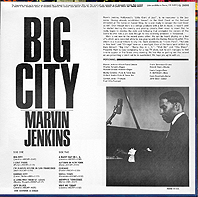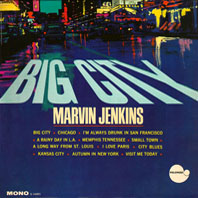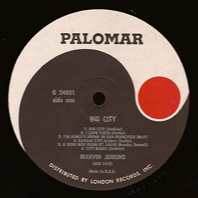| DISCOGRAPHY PART 2 |
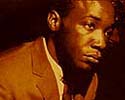 |
|
 discography
1 2 3 (original) 4 5 6 (compilations) I photos I press discography
1 2 3 (original) 4 5 6 (compilations) I photos I press |
 |
1 2 biography |
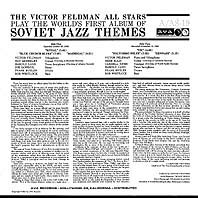
| Victor Feldman,
born April 7, 1934, was a child prodigy who was a professional from
the age of seven and sat in on drums with Glenn Miller's Army Air
Force Band in 1944 when he was ten. He was active in his native
England through the bebop years (mostly on drums), debuting as a
leader in 1948. By 1952 Feldman was getting better-known for his
vibes playing and he recorded extensively during the 1950s. After
touring with Woody Herman (1956-57), he decided to move to the U.S.
in 1957 where he worked at the Lighthouse with Howard Rumsey. Feldman
recorded (on vibes and piano) for Mode, Contemporary |
|
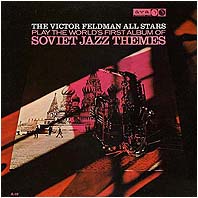
click images to enlarge
| and Riverside during 1957-61, a period in which
he became a busy studio musician. Feldman was with Cannonball Adderley's
Quintet (mostly as a pianist) for 6 months in `60-`61 and recorded
with Miles Davis in `63 (who offered him a job with his new quintet
and recorded his original 'Seven Steps to Heaven') but remained
in L.A. and the studios. He cut jazz dates for Choice, Concord,
Palo Alto and TBA and in the 1980s up until his death he led a soulful
crossover group (The Generation Band) that often featured his son
Trevor Feldman on drums. |
|
The
Victor Feldman All Stars
Play The World's First Album Of Soviet Jazz Themes
recorded: 1962
issued: 1962 AVA AS-19 (USA) (original release) ; August 1963 AVA A-19
VICTOR FELDMAN (vib, p Side A, keyb ?); NAT ADDERLEY (cor Side A), HAROLD
LAND (ts); HERB ELLIS (g Side B), CARMELL JONES (tp Side B), JOE ZAWINUL
(p Side A); BOB WHITLOCK (b); FRANK BUTLER (dr)
Side A
1. Ritual
2. Blue Church Blues
3. Madrigal
Side B
1. Vic
2. Polyushko Polye
3. Gennadi
Note: Liner notes by Leanord Feather. These were tunes that Feldman
heard from tapes made on the Benny Goodman trip to Moscow in 1962. AVA was distributed
by MGM, and lasted from 1962-1964. It specialized in soundtracks and jazz,
with Elmer Bernstein being its major artist. |
click the first 4
|
images to enlarge
|
|
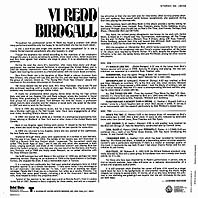
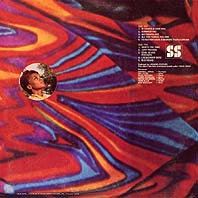
| These
are the very first recordings of Roy Ayers, recorded two years before
his solo debut, ‘West Coast Vibes’, was released. All
tunes on this album were recorded by Charlie Parker or are a dedication
to him. ‘Bird Call’ was produced by Leo ard Feather
and contains the first vocal version of the Parker classic ‘Anthropology’. |
|
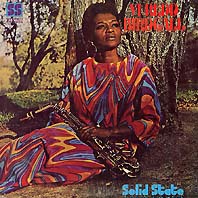
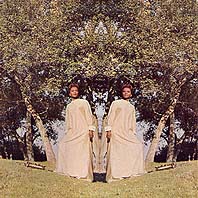
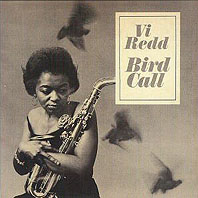 |
Now's The Time Bird Call / Vi [Elvira] Redd
recorded: 1962
issues: 1962 as Now´s The Time
UNITED ARTISTS UAS-15106 & UAJS-15016
re-issued: 1969 as Bird Call SOLID STATE
SS 18038 ;
EMI/TOSHIBA (Japan) (see note below)
VI REDD (as, voc); CARMELL JONES [on the original issue under the pseudonym
KANSAS LAWRENCE] (tp); RUSS FREEMAN (p); ROY AYERS (vib); HERB ELLIS
(g); LEROY VINNEGAR, BOB WHITLOCK (b); RICHIE GOLDBERG (dr); produced
by LEONARD FEATHER
Side A
1. If I Should Lose You
2. Summertime
3. Anthropology
4. All The Things You Are
5. I'd Rather Have A Memory
Than A Dream
Side B
1. Now's The Time
2. Just Friends
3. Cool Blues / Perhaps
4. I Remember Bird
5. Old Folks |
(Robin/Ralph Rainger)
(G. Gershwin/DeBose Heyward)
(Charlie Parker/Dizzy Gillespie/W. Bishop)
(Oscar Hammerstein/Jerome Kern)
(L. Feather/J. Russell)
(Charlie Parker)
(S. M. Lewis/John Klenne)
(Charlie Parker/Charlie Parker Jr.)
(L. Feather)
(W. Robison/L. Hill) |
Note: Just released
by EMI/TOSHIBA in Japan but only for sale for members of the Blue Note
Club (Japanese only Club). This issue is housed in the famous carton
sleeve (mini LP) format (as made well known in the Blue Note and other
TOCJ series) and remastered by the Japanese Terra Studio in 24 Bit resolution.
The CD is unavailable in any shop around the world and produced in very
small limited quantities. |
| |
|
|
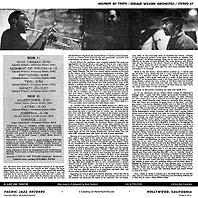
click image to enlarge
| Review:
Gerald Wilson's Pacific Jazz albums of the 1960s were arguably the
most significant of his career.This LP has among its highlights
the original version of 'Viva Tirado' (a catchy number made into
a surprise pop hit by El Chicano later in the decade) and a driving
rendition of 'MIlestones'; the other seven songs (six of which are
Wilson's originals) are also quite enjoyable. Among the more notable
soloists are trumpeter Carmell Jones, both Teddy Edwards and Harold
Land on tenor, guitarist Joe Pass, and pianist Jack Wilson. Recommended. |
|
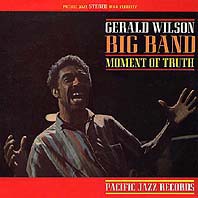
click image to enlarge / PJ-61
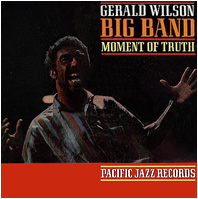 |
Moment Of Truth / Gerald Wilson Orchestra
recorded: August/September 1962 at Pacific Jazz Studio in Hollywood
issues: 1963 PACIFIC JAZZ PJ-61 (mono), PACIFIC JAZZ ST-61 (stereo) ;
1989 CD PACIFIC JAZZ B2-92928 ; CD BLUE NOTE
Side A recorded August 27, GERALD
WILSON (arr, cond); CARMELL JONES, JULES CHAIKIN, JOHN AUDINO, FRED HILL
(tp); BOB EDMONDSON, LOU BLACKBURN, FRANK STRONG, BOB KNIGHT (tb); TEDDY
EDWARDS, HAROLD LAND (ts); JOE MAINI (as); DON RAFFELL (reeds); BUD SHANK
(fl); JACK WILSON (p); JOE PASS (g); JIMMY BOND (b); MEL LEWIS (dr)
Side B recorded
September, same personnel as above except AL PORCINO is added to
trumpet section, KENNY SHROYER & LES ROBERTSON replace FRANK STRONG
& BOB KNIGHT, JACK NIMITZ replaces DON RAFFELL; MODESTO DURAN (cga) is
added on #A1 & B2
Side A
1. Viva Tirado
2. Moment Of Truth
3. Patterns
4. Teri
5. Nancy Jo
Side B
1. Milestones (Miles Davis)
2. Latino
3. Josefina
4. Emerge (Les Robertson)
All written by Gerald Wilson except where noted. |
|
|
|
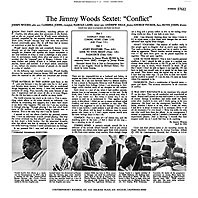
| Review:
It's hard to understand why Jimmy Woods recorded so little before evidently
retiring from jazz. His entire recorded legacy includes just a pair
of dates as a sideman and two albums for Contemporary. Woods' final
date as a leader is a memorable affair, with an all-star cast of
musicians, including trumpeter Carmell Jones, tenorist Harold Land,
pianist Andrew Hill, bassist George Tucker, and drummer Elvin Jones,
all of whom (except Tucker) recorded as leaders before the decade
was over. |
|
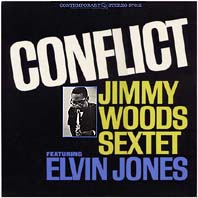
| The
program is made of six originals, including the tense, bluesy march
'Conflict'; the turbulent 'Aim'; and the tricky (and well-named)
'Apart Together'. His one ballad of the date is the unusually structured
'Look To Your Heart'. While all of the soloists are impressive and
Jones' powerful drumming fuels the horn players, the leader's adventurous
alto sax is not to be missed. This
long-overdue re-issue in Fantasy's limited-edition OJC series adds
three valuable alternate takes. |
|
Conflict / Jimmy Woods Sextet
recorded: March 25 & 26, 1963 at Contemporary Records in Los Angeles
issues: November 1963 CONTEMPORARY S-7612 ; CONTEMPORARY C-3612
(Continental Music Distribution) ; VOGUE LACM 6025 (New Zealand) ;
September 4, 2001 CD JVC (Japan) 60793 ;
re-issue with bonus tracks: April 22, 2003, CD ORIGINAL JAZZ CLASSICS
1954
JIMMY WOODS (as); CARMELL JONES (tp); HAROLD LAND (ts); ANDREW HILL
(p); GEORGE TUCKER (b); ELVIN JONES (dr)
Side A
1. Conflict
2. Coming Home
3. Aim
Side B
1. Apart Together
2. Look To Your Heart
3. Pazmuerte |
CD
ORIGINAL JAZZ CLASSICS 1954
1. Conflict
2. Coming Home
3. Aim
4. Apart Together
5. Look To Your Heart
6. Pazmuerte
7. Conflict [bonus track]
8. Aim [bonus track]
9. Look To Your Heart [bonus track] |
All written by Jimmy Woods
|
| |
|
|
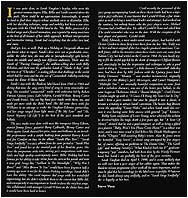
| Review:
Sarah Vaughan's final Roulette session before going back to Mercury
was one of her best. Some of the tunes (such as 'A Taste of Honey',
'What Kind of Fool Am I' and 'The Good Life') do not look all that
promising but Sassy was near the peak of her powers during this
era. Plus her renditions of 'I Guess I'll Hang My Tears out to Dry',
'Sermonette', 'Gravy Waltz', 'Moanin', 'Round Midnight' and 'Midnight
Sun' are classics. Assisted by a sextet arranged by Gerald Wilson
and including organist Ernie Freeman, trumpeter Carmell Jones and
the tenor of Teddy Edwards, Vaughan is brilliant throughout this
highly enjoyable CD reissue. |
|
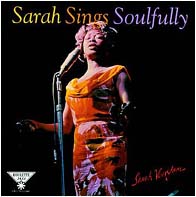
click images to enlarge |
Sarah Sings Soulfully / Sarah Vaughan
recorded: June 6, 1963
issues: ROULETTE CDP 7984452 ; BLUE NOTE RECORDS ; 1993 CD & CS CAPITOL
SARAH VAUGHAN (voc); CARMELL JONES (tp); TEDDY EDWARDS (ts); ERNIE FREEMAN (org); MILT TURNER (dr); GERALD WILSON (arr.)
1. A Taste Of Honey
2. What Kind Of Fool Am I?
3. I Guess I'll Hang My Tears Out To Dry
4. Sermonette
5. In Love In Vain
6. Gravy Waltz
7. The Good Life
8. Moanin'
9. 'Round Midnight
10. Easy Street
11. Baby Won't You Please Come Home
12. Midnight Sun |
(Ric Marlow /Bobby Scott)
(Leslie Bricusse/A. Newley)
(Cahn/Styne)
(C. Adderley/Jon Hendricks)
(Kern/Robbin)
(Allen/Brown)
(Sasha Distel /Jack Reardon)
(Hendricks/B.Timmons/C. Mingus)
(Hanighen/T. Monk/Williams)
(Alan R. Jones)
(C. Williams/Charles Warfield)
(S. Burke/J. Mercer/L. Hampton) |
|
| |
|
|
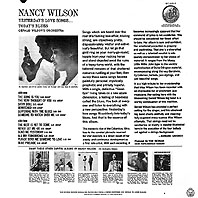
click image to enlarge
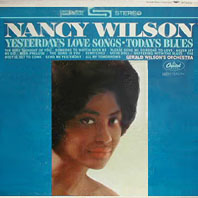
| Review:
Originally released in December 1963, Yesterday's Love Songs-Today's
Blues was the eighth in a long series of albums Nancy Wilson was
to make for Capitol Records over a period of 20 years. During
that time, she became one of the
label's most artistically and commercially successful artists.
The album was also made during the time when major recording companies
were turning out sessions featuring black |
|
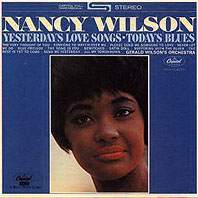
| female
singers with a Gospel and/or Blues background, singing standards
and pop hits backed by a large orchestra, usually with strings.
Columbia
Records had Aretha Franklin, Everest used Gloria Lynne, and Capitol,
Nancy Wilson. Here, teamed with the Gerald Wilson Orchestra and
his arrangements, Wilson wends her way through 17 standards and
traditional Pop songs with a good balance between ballads and up-tempo
numbers. Wilson 's aggregation is loaded with many of the day's
top West Coast players. Trumpeters Al Porcino and Carmell Jones
are especially prominent, with Jones soloing on ‘The Song
Is You’. Harold Land 's tenor provides the backdrop for ‘Satin
Doll’. On the last four tracks, Wilson is accompanied by just
a rhythm section featuring Wild Bill Davis on organ and Joe Pass
on guitar. Wilson and Davis combine to do a swinging R&B-tinged
‘West Coast Blues’ and ‘My Sweet Thing’,
the album's highlights. In between these two cuts is the cloying
‘Tell Me The Truth’, originally issued on a 45 EP and
aimed at the female teenaged market of the time. |
|
Yesterday's Love Songs - Today's Blues / Nancy Wilson
recorded: March / October 1963 in Los Angeles
original release: December 1963 CAPITOL ST-2012 (Canada) stereo ;
other issues: 1964 LP CAPITOL T2012 (mono) ; BLUE NOTE ST-2012 (stereo) ;
CD CAPITOL 96265 ; 1991 CD BLUE NOTE B2-96265, CS BLUE NOTE B4-96265 ;
#A1-6, #B1-6 also
on CD BLUE NOTE/CAPITOL JAZZ CDP 7 96265 2 + bonus tracks ;
#B7 originally issued as 7 Inch CAPITOL
5084 ; #B8-9 originally on How Glad I Am, CAPITOL ST-2155 ; #10,11 originally on 45 EP CAPITOL 499
#A1,3-5, #B1,3,4,6 recorded October 8 & 10,
1963, NANCY WILSON (voc); GERALD WILSON ORCHESTRA: GERALD WILSON (arr.);
AL PORCINO (lead), CARMELL JONES (solo on #1), JULES CHAIKIN, FREDDIE
HILL (tp); BOB EDMONDSON, JOHN EWING, LESTER ROBERTSON (tb), KENNY SHROYER
(b-tb); PAUL HORN (as); TEDDY EDWARDS, HAROLD LAND (solo on #3) (ts);
DON RAFFELL (bar-s); JOE MAINI (reeds); JACK WILSON (p on #1-13); WILD
BILL DAVIS (org on #14-17); JOE PASS(g); JIMMY BOND (b); KENNY
DENNIS (dr)
#A2,6, #B2,5,7
recorded October 9, 1963, same rhythm section (Wilson doubing celeste)
+ full strings section: ANN GOODMAN, EDGAR LUSTGARTEN, GEORGE POOLE
(cello); FELIX & ELEANOR SLATKIN, GERALD VINCI, ISRAEL BAKER, JACQUES
GASSELIN, THELMA BEACH, BONNIE DOUGLAS, MARSHALL SOSSON, LOU RADERMAN,
PAUL SHURE, JAMES GETZOFF (v); VIRGINIA MAJEWSKI, PAUL ROBYN, ALVIN
DINKIN, STANLEY HARRIS (viola)
#B8-11 recorded March 30, 1963 with the
same rhythm section
Side A
1. The Song Is You
2. The Very Thought Of You
3. Satin Doll
4. Bewitched
5. Suffering With The Blues
6. Someone To Watch Over Me
Side B
1. The Best Is Yet To Come
2. Never Let Me Go
3. Send Me Yesterday
4. All My Tomorrows
5. Please Send Me Someone To Love
6. Blue Prelude
7. What Are You Doing New Year's Eve?
8. Show Goes On
9. West Coast Blues
10. Tell Me The Truth
11. My Sweet Thing |
(Hammerstein/Kern)
(Nobel)
(Ellington/Mercer/Strayhorn)
(Hart/Rodgers)
(Conyers/Pemberton)
(Gershwin/Gershwin)
(Coleman/Leigh)
(Evans/Livingston)
(Smith)
(Cahn/Van Heusen)
(Mayfield)
(Bishop/Jenkins)
(Loesser)
(Roth)
(Montgomery)
(Jackson) |
#B7-11 were not part of the original album ! |
| |
|
|
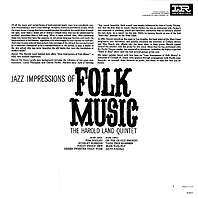 |
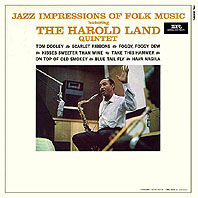
click images to enlarge |
Jazz Impressions Of Folk Music / The Harold Land Quintet
recorded: December 1963
issues: IMPERIAL P-9247 ; 1963 IMPERIAL P-12247
HAROLD LAND (ts); CARMELL JONES (tp); JOHN HOUSTON (p); JIMMY
BOND (b); MEL LEWIS (dr)
Side A
1. Tom Dooley
2. Scarlet Ribbons
3. Foggy Foggy Dew
4. Kisses Sweeter Than Wine
Side B
1. On Top Of Old Smokey
2. Take This Hammer
3. Blue Tail Fly
4. Hava Nagila |
| |
|
|
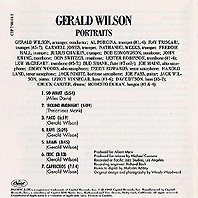
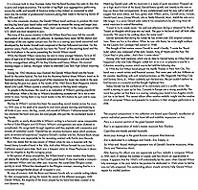
| Reviews:
This fine CD reissue of an earlier LP features the colorful Gerald
Wilson Orchestra. Wilson's arrangements have always been distinctive
and his reworkings of 'So What' and 'Round Midnight' (which are
performed here along with five of the leader's lesser-known
originals) are inventive. With such top L.A.-based players as trumpeter
Carmell |
|
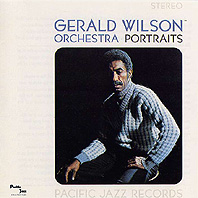
click images to enlarge
Jones, Teddy Edwards and Harold Land on tenors, guitarist Joe
Pass and pianist Jack Wilson, this was a very impressive unit
although now somewhat underrated.
--
Gerald Wilson's jazz orchestra of the 60´s was one of the most finely-tuned
and well-rehearsed units on the West Coast and in jazz anywhere.
He was a great leader - inventive, autocratic, visionary and unsung,
which spurred him to greater heights. This album by the Gerald Wilson
Orchestra, Portraits, is a solid recording, and a fantastic listen
from start to finish with not a dip anywhere. Highly recommended.
This al- bum was originally released in 1963 for Pacific Jazz, then
re-released in 1992 after Capitol Records acquired that label. It
is a cut-out. With Harold Land, Joe Pass, Teddy Edwards, Carmell
Jones, and the incredible (and not often recorded) Jack Wilson on
piano to name a few, this disc has an incredible line-up. |
|
Portraits / Gerald Wilson Orchestra
recorded: December 2, 1963 (#1,3,4,6), January 8, 1964
(#2,5,7) at PJ Studios Hollywood
issues: 1964 PACIFIC JAZZ PJ-80 ; CD PACIFIC/CAPITOL CDP 7 93414-2 ;
1992 CD CAPITOL ; 1992 CD PACIFIC
JAZZ CDP 793414-2 ;
January 14, 1992 CD BLUE NOTE ; 1996 EMI - Irs (Intercord/EMI Distribution)
GERALD WILSON (arr, cond); AL PORCINO (tp #1-4); RAY TRISCARI (tp #5-7);
CARMELL JONES, NATHANIEL MEEKS, FREDDIE HILL, JULES CHAIKIN (tp); BOB
EDMONDSON, JOHN EWING, DON SWITZER (tb); LESTER ROBINSON (tb #1-4), LEW
MCCREARY (tb #5-7); JOE MAINI, JIMMY WOODS (as); TEDDY EDWARDS, HAROLD
LAND (ts); JACK NI- MITZ (bar-s); BUD SHANK (fl #7); JACK WILSON (p);
JOE PASS (g); LEROY VINNEGAR (b #1-4); DAVE DYSON (b #5-7); CHUCK CARTER
(dr); MODESTO DURAN (bgo #3,4)
1. So What (portrait of Miles)
2. 'Round Midnight (portrait of Thelonious Monk)
3. Paco (portrait of the great Spanish matador)
4. Ravi (for Ravi Shankar)
5. Aram (the great Russian composer Khatchaturian)
6. Eric (for colleague and friend Eric Dolphy)
7. Caprichos (moods painted musically)
All written by Gerald Wison except #1 by Miles Davis, #2 by Thelonious Monk. |
| |
|
|
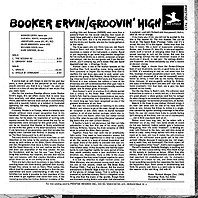
click images to enlarge
| Reviews:
Tenor saxophonist Booker Ervin's reputation was solidified in the
mid-sixties with the series of "book" albums he released on Prestige
- The Freedom Book, The Song Book, The Blues Book, and The Space
Book. The tracks on the present collection are necessary to appreciate
the Blues and Space volumes unabridged, as it were. Products of
the same sessions, they contain all of the breaking-point intensity
of Ervin's best work and are by no means left-overs. Of particular
interest is ‘The Second #2’, one of the saxophonist's
most famous themes and the ultimate expression of the incredible,
studio-only quartet of Ervin, Jaki Byard, Richard Davis, and Alan
Dawson. There |
|
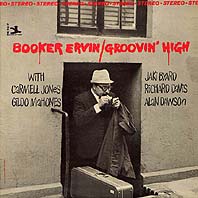
PRESTIGE 7417
is also a blues that places Ervin in the
Texas tenor pantheon, and classic bebop on the title track from
a quintet with Carmell Jones and Gildo Mahones.
--
Groovin' High
Pour finir, un album qui contient des sessions non retenues pour
The Blues Book et The Space Book. Booker est au mieux de sa forme
sur le blues Bass-IX, un blues très avancé pour son
temps où Richard Davis montre la puissance de son jeu de
basse. Groovin’ High est le vieux thème de Gillespie
qui donne son titre à l'album. Booker se montre toujours
aussi rapide et furieux et Carmell Jones chauffe tout au long de
l'enregistrement. Néanmoins, il s'agit là de matériel
de moindre qualité. |
|
Groovin' High / Booker Ervin
recorded: December 3, 1963 (#1), October 2, 1964
(#2,3), June 10, 1964 (#4)
issues: PRESTIGE 8428131 ; PRESTIGE 7417 (stereo) ; OJC-919
re-released: February 2, 1997 HIGHPREST 8428131
BOOKER ERVIN (ts); CARMELL JONES (tp #A2); JAKI BYARD (p #A1, #B1,2);
GILDO MAHONES (p #A2); RICHARD DAVIS (b); ALAN DAWSON (dr)
Side A
1. The Second #2
2. Groovin' High
Side B
1. Bass-IX
2. Stella By Starlight |
(Ervin)
(Gillespie)
(Ervin)
(Washington/Victor Young) |
|
| |
|
|
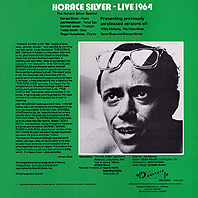
click image to enlarge
| Review:
Released by Horace Silver's own label, this LP contains "new" versions
of 'Filthy McNasty', 'The Tokyo Blues', 'Señor Blues' and
the lesser-known 'Skinney Minnie', as played by his quintet with
tenorman Joe Henderson and trumpeter Carmell Jones. These renditions
make for an interesting comparison with the earlier versions cut
by Silver with Junior Cook and Blue Mitchell and they are reasonably
well-recorded. Recommended. |
|
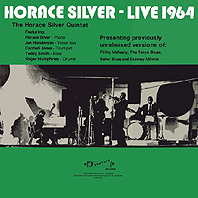
click image to enlarge
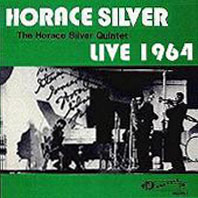 |
The Horace Silver Quintet Live 1964
recorded: June 6, 1964 at "The Cork & Bib" nightclub, in Westbury. Long Island/NY
issued: 1964 EMERALD EMR-1001 (USA)
HORACE SILVER (p); CARMELL JONES (tp); JOE HENDERSON (ts); TEDDY
SMITH (b); ROGER HUMPHRIES (dr)
1. Filthy McNasty
2. The Tokyo Blues
3. Señor Blues
4. Skinny Minniespan
All written by Horace Silver |
| |
|
|
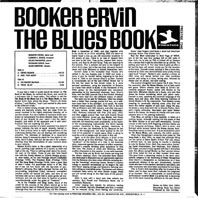
click image to enlarge
Reviews:
For this CD reissue in his series of Books, Ervin and his quintet
(with trumpeter Carmell Jones, pianist Gildo Mahones, bassist Richard
Davis and drummer Alan Dawson) perform four very different blues:
the speedy 'One for Mort', a low-down 'No Booze Blooze', the modal
'True Blue' and the minor-toned 'Eerie Dearie'. The consistently
passionate Ervin makes each of the fairly basic originals sound
fresh and the performances are frequently exciting inside/outside
music.
--
The tenor saxophonist Booker Ervin first received national notice in a Charles Ming- us
group of the late 1950s. He came into his own during the Sixties
in a series of albums for Prestige. The third of those collections,
The Blues Book, defines Ervin's musical center. A Texan with all
the traditional attributes of the best Texas tenors, he was immersed
in the blues and they permeated everything he played. Here, he luxuriates
in the |
|
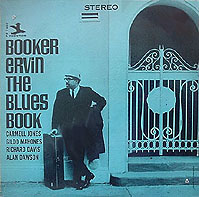
variety and purity
of the form, from the minor mysteries of 'Eerie Dearie' to the fundamentals
of 'No Booze Blooze'. Among his companions is the highly regarded
trumpeter Carmell Jones.
--
The Blues Book (Prestige) date du milieu de 1964. Ici, Booker Ervin est tout à
fait dans son élément, le blues. On retrouve un trompettiste,
cete fois c'est Carmell Jones, qui fait merveille avec un son délicat
servi par des idées qui jaillissent avec force. Gildo Mahones,
le pianiste est une surprise. Il a connu une certaine notoriété
en collaborant avec Miles Davis et plus tard Lambert-Hendricks-Ross.
Il possède un style personnel, avec de dissonnances souvent
inattendues dans des phrases coulées. Les blues qu'ils soient
médium, rapides ou lents font apparaître l'intensité
de la déclamation charactéristique du phrasé
de B. Ervin. La piste la plus longue No Booze Blooze est le sommet
de cet enregistrement. |
|
The Blues Book / Booker Ervin
recorded: June 30, 1964 in Englewood Cliffs,
New Jersey
issues: 1964 FANTASY ; PRESTIGE 7340 ; OJCD-780-2 ; VICJ-23783 ;
ORIGINAL JAZZ CLASSICS OJC-780 ; CD OJC 6925621
BOOKER ERVIN (ts); CARMELL JONES (tp); GILDO MAHONES (p); RICHARD
DAVIS (b); ALAN DAWSON (dr)
1. Earie Dearie
2. One For Mort
3. No Booze Blooze
4. True Blue
5. Groovin' High |
| |
|
|
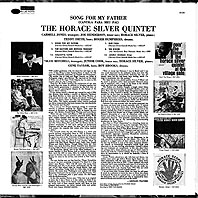
click image to enlarge
| Reviews:
This album marks a peak in creativity for Horace Silver. With the
aid of sidemen Joe Henderson, tenor sax, Carmell Jones, trumpet,
Teddy Smith, bass and Roger Humphries, drums he produced in ‘Song
For My Father’, his most popular and successful album. They
don't make them like this anymore. Blue Note albums of this period
(mid sixties) were recorded straight to two track analog tape, so
what you hear is very much the sound of the band that Horace had
led for the previous five years. They kick off with the classic
‘Song For My Father’, a groovy latin tune. Silver's
solo is played in a declamatory blues style. Henderson follows,
building the excitement and peaking with a series of repetitive
phrases reminiscent of Gato Barbieri"s intense latin style of sax
playing. The up tempo ‘The Natives Are Restless Tonight’
is the next track. Carmell Jones flowing and melodic trumpet precedes
Henderson in Coltrane mood. As with almost every track on this album,
this Silver composition is a jazz classic which served as a stylistic
template for scores of other Jazz groups, both in the USA and Europe.
Other album highlights include Joe Hendersons own tune ‘The
Kicker’. His masterful solo is all the more impressive in
comparison with the more faltering contributions of both Jones and
Silver. |
|
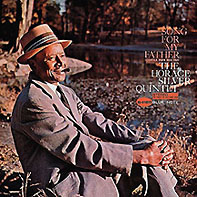
Drummer Humphries however, is given space
to thrash around and proves himself an exciting soloist. In complete
contrast, ‘Lonely Woman’ is a sensitive ballad penned
by Silver. The quirky piano solo on this track illustrates what
an original and inventive soloist Silver can be. His unique approach
to piano playing coming from the fact that his first instrument
was sax and he came to piano as a first instrument relatively late
in his professional career. John Tavares Silver (Horaces dad) should
be very proud that an album of this fine quality was dedicated to
him.
--
One of the great ones, and one of those Blue Notes that still makes you stop and
pause when you hear it, even though you have heard it a million
times in Starbucks and places like that. Carmell Jones plays some
of his best trumpet ever, and Joe Henderson's nice and moody. With
'Que Pasa', 'The Kicker' and, of course, the title cut. This great
CD reissue also adds a whole bunch of extra cuts to the original
album, including new material never heard before, and a trio version
of 'Que Pasa'. 10 cuts in all! As an added bonus, the set's packaged
in a nice outside sleeve, with 24-bit remastering by Rudy Van Gelder,
who recorded the original session in the 60s ! |
|
Song For My Father / Horace Silver
recorded: October 31, 1963 (#3,6-8); January 28, 1964 (#9-10) and October
26, 1964 (#1,2,4,5) at Van Gelder Studio, Englewood Cliffs/NJ
originally issued: #1-6 on BLUE NOTE BLP-4185 and BST-84185 (stereo)
other issues: LIBERTY RECORDS (2nd issue) ; 1989 CD & CS BLUE NOTE 8418528 ;
October 25, 1990 BLUE NOTE 84185 ; 1996 BLUE NOTE 99002 (RVG Remaster Edition) ; 1997 LP BLUE NOTE ;
April 12, 1999 CD BLUE NOTE 9719183 (Ltd. Edition) ;
1999 CD BLUE NOTE 2953229, 9721230 ; CD CAPITOL
#1 also on 7 Inch BLUE NOTE 1912 (1964) and on:
Blue Note's Three Decades Of Jazz 1959-1969 BLUE NOTE BST-89904,
Decades Of Jazz Vol. 3 BN LA-160-G2 ; The Best Of Blue Note Vol.
1 BN BT-84429 ; Silver's Serenade / Horace Silver BN LA-402-H2 ;
#6 also on The Trio Sides BN LA-474-H2
#1,2,4,5
HORACE SILVER (p); CARMELL JONES (tp); JOE HENDERSON (ts);
TEDDY SMITH (b); ROGER HUMPHRIES (dr)
#3,6-10
HORACE SILVER (p); BLUE MITCHELL (tp); JUNIOR COOK (ts);
GENE TAYLOR (b); ROY BROOKS (dr)
1. Song For My Father
2. The Natives Are Restless Tonight
3. Calcutta Cutie
4. Que Pasa ?
5. The Kicker
6. Lonely Woman
7. Sanctimonious Sam
8. Que Pasa ? (Trio Version)
9. Sighin' And Cryin'
10. Silver Treads Among My Soul |
(Horace Silver)
(Horace Silver)
(Horace Silver)
(Horace Silver)
(Joe Henderson)
(Horace Silver)
(Musa Kaleem)
(Horace Silver)
(Horace Silver)
(Horace Silver) |
#7-10 were not part of the original album ! |
| |
|
|
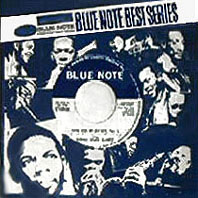 |
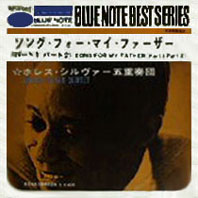 |
Song For My Father / Horace Silver
recorded: October 26,1964 at Van Gelder Studio, Englewood Cliffs/NJ<
issued: 7 inch EP BLUE NOTE NP-2007 (Japan)
HORACE SILVER (p); CARMELL JONES (tp); JOE HENDERSON (ts); TEDDY SMITH (b); ROGER HUMPHRIES (dr)
Side A
1. Song For My Father (Part 1)
Side B
1. Song For My Father (Part 2) |
| |
|
|
| |
|
Silver's Serenade / Horace Silver Quintet
recorded: April 11/12 (#1-6), Oct. 31, 1963 (#7), Oct. 26, 1964 (#8-12) at VGS-Englewood Cliffs
issues: BLUE NOTE BLP-4131 ; #6 also on BLUE NOTE BLP-4185 ;
BLUE NOTE BN-LA 402-H2
HORACE SILVER (p); BLUE MITCHELL (#1-7), CARMELL JONES (#8-11) (tp); JUNIOR
COOK (#1-7), JOE HENDERSON (#8-11) (ts); GENE TAYLOR (#1-7,12), TEDDY
SMITH (#8-11) (b); ROY BROOKS (#1-7,12), ROGER HUMPHRIES (#8-11) (dr)
1. The Dragon Lady
2. Let's Get To The Nitty Gritty
3. Nineteen Bars
4. Silver's Serenade
5. Sweet Sweetie Pie
6. Song For My Father
7. Calcutta Cutie
8. The Kicker
9. The Natives Are Restless Tonight
10. Que Pasa
11. Song For My Father
12. Lonely Woman
Note: Another source lists for Silver's Serenade the following:
May 7-8, 1963, BLUE NOTE BP-4131 ; 1963 BLUE NOTE BST-84131
; 1998 CD BLUE NOTE 21288; Horace Silver (p); Blue Mitchell (tp); Junior
Cook (ts); Eugene Taylor (b); Roy Brooks (dr); 1. Silver's Serenade, 2.
Let's Get To The Nitty Gritty, 3. Sweet Sweetie Pie, 4. The Dragon Lady,
5. Nineteen Bars |
| |
|
|
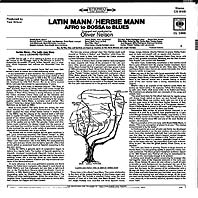
click image to enlarge
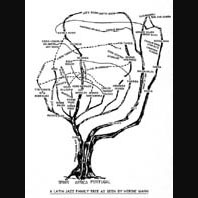
click image to enlarge
| Reviews:
Latin forms started infiltrating their way into Jazz in a big way
in the early 50´s, and by the time that the 60´s arrived,
it had spread from Cuban rhythms, to those heard further south in
the hemisphere. Herbie Mann, always looking for something new, built
this album of tunes with a whole kettle full of influences, from
Mongo Santamaria, to Tito Puente and Tito Rodriguez, all
the way to the sounds he was exploring from Brazil, and beyond.
To help him out on this venture, he's assembled a cool group that
includes (among others) Chick Corea, Willie Bobo, Dave Pike, Carmell
Jones, and Jimmy Heath. |
|
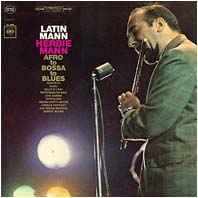
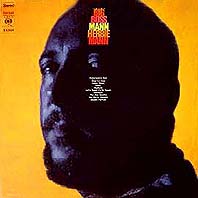
Big Boss Mann
On the back of the album are extensive notes on each of the songs, and
the journey to find them.
--
Herbie Mann has selected a group of top notch Latin Jazz musicians to create this
compilation of popular tunes which Mann describes as a "Latin
Jazz Family Tree" (as pictorially illustrated on back of album),
showing the relationship of a gradual blending of Afro-Cuban music
and American Jazz on this LP. A listing of the impressive sidemen
performing on this album. The excellent liner notes were compiled
by Leonard Feather. |
|
Latin Mann - Afro To Bossa To Blues / Herbie Mann
recorded: 1964
issues: 1965 COLUMBIA CS-9188 (stereo), COLUMBIA CL-2388 (mono) ;
also released as Big Boss Man 1965 COLUMBIA CS 1068 ; 1973 COLUMBIA/CBS (NL)
HERBIE MANN (fl); CARMELL JONES *, JERRY KAIL, ERNIE ROYAL, JOE NEWMAN
(tp); JACK HITCHCOCK, MARK WEINSTEIN (tb); QUENTIN JACKSON, TONY STUDD
(b-tb); JIM- MY HEATH * (ts); DANNY BANK (b-cl); CHICK COREA, CHARLIE
PALMIERI (p); DAVE PIKE * (vib); EARL MAY, BOBBY RODRIGUEZ (b); BRUNO
CARR (dr); WILLIE BOBO, RAFAEL DA VILA, CARLOS DIAZ, TOMMY LOPEZ, JOSÉ
MANGUAL, WILLIE RODRIGUEZ, RAYMOND SARDINIS, CARLOS "PATATO" VALDES (latin
perc); OLIVER NELSON (arr, cond); RAFAEL DA VILA, CARLOS DIAZ & RAYMOND
SARDINIS (voc on #A 5 & B4); * featured soloists
Side A
1. Let's Boom Chitty Boom
2. What'd I Say
3. Señor Blues
4. Bijou
5. Jungle Fantasy
Side B
1. Watermelon Man
2. Interlude
3. The Jive Samba
4. Ave Maria Morena
5. Manteca |
(H. Mann)
(R. Charles)
(H. Silver)
(R. Burns)
(E. Morales)
(H. Hancock)
(P. Rugolo)
(N. Adderley)
(J. C...belo?)
(W. Fuller/J. Gonzales/D. Gillespie) |
Note: Stereo-Columbia CS 9188, 1965 release, by jazz flutist Herbie Mann,
arranged and conducted by Oliver Nelson, is the first pressing, and
the more desirable stereo copy, on the 360 degree sound label. The sessions
feature some great players from Carmell Jones to Joe Newman, Ernie Royal,
Jimmy Heath, Chick Corea and others. In addition, eight celebrated Latin
percussionists, including Willie Bobo and Carlos "Patato" Valdez, join
in. |
| |
|
|
 |
|

















